-
ORIGINAL ARTICLE12-13-2024
Nurses’ experience regarding patient safety in mobile pre-hospital care
Revista Brasileira de Enfermagem. 2024;77(5):e20230529
Abstract
ORIGINAL ARTICLENurses’ experience regarding patient safety in mobile pre-hospital care
Revista Brasileira de Enfermagem. 2024;77(5):e20230529
DOI 10.1590/0034-7167-2023-0529
Views0See moreABSTRACT
Objectives:
to understand nurses’ experience regarding patient safety in mobile pre-hospital care.
Method:
a qualitative, exploratory and descriptive study, conducted with nurses active in mobile pre-hospital care services. Semi-structured interviews were conducted, audio-graved and submitted to Bardin’s content analysis.
Results:
from four thematic categories established, nurses reported the care and management skills necessary to work in this service. They demonstrated a commitment to ensuring safe care for patients, staff and spectators. They highlighted the actions taken to prevent and mitigate incidents. However, they based their experiences on practice protocols and individual actions, expressing the need to improve knowledge about patient safety.
Final Considerations:
mobile pre-hospital care nurses’ experience in relation to patient safety was limited, suggesting the need for training on the subject, alignment of work processes and implementation of strategies, aiming to guarantee safe care.
-
ORIGINAL ARTICLE12-13-2024
Repercussions of the pandemic on tuberculosis control actions from the perspective of health professionals
Revista Brasileira de Enfermagem. 2024;77(5):e20230477
Abstract
ORIGINAL ARTICLERepercussions of the pandemic on tuberculosis control actions from the perspective of health professionals
Revista Brasileira de Enfermagem. 2024;77(5):e20230477
DOI 10.1590/0034-7167-2023-0477
Views0See moreABSTRACT
Objectives:
to analyze the repercussions of the COVID-19 pandemic on tuberculosis control actions from the perspective of primary health care professionals.
Methods:
this descriptive study with a qualitative approach was conducted from November 2022 to April 2023, using semi-structured interviews with 11 key informant professionals from primary health care units in a Brazilian capital. Data were organized using Atlas.ti 22.0 software and subjected to thematic-categorical content analysis.
Results:
the pandemic scenario caused alterations in the work process, necessitating abrupt adaptations, and led to detrimental impacts on the health of professionals and tuberculosis control actions, which were reduced or discontinued.
Final Considerations:
there was evident unpreparedness and a lack of resources from various governmental levels and health services to handle the public health emergency situation without severe harm to the provision of essential services.
-
12-13-2024
Training of Brazilian indigenous nurses: between human rights, valuing diversity and inclusion
Revista Brasileira de Enfermagem. 2024;77(5):e20230430
Abstract
Training of Brazilian indigenous nurses: between human rights, valuing diversity and inclusion
Revista Brasileira de Enfermagem. 2024;77(5):e20230430
DOI 10.1590/0034-7167-2023-0430
Views0See moreABSTRACT
Objectives:
to analyze the possibilities and potential of training indigenous nurses, given the Brazilian Health System (SUS), understanding the relationships between education and health.
Methods:
theoretical-reflective study, based on scientific literature, aligned with the experience, critical thinking of its authors and the Sustainable Development Goals in Brazil.
Results:
this text articulates three axes: Potential for including indigenous students in nursing training; Paths to achieving equity through inclusion and retention policies for indigenous students at different levels; and Implications of this for the SUS and global health.
Final Considerations:
indigenous students, beneficiaries of affirmative actions, face challenges of inclusion and retention in public universities that directly impact their academic training. Added to this are the difficulties identified in basic education, professor training and implementation of permanence policies, with consequences for services and training at other levels.
-
ORIGINAL ARTICLE12-13-2024
Interobserver agreement in Reception and Risk Stratification in Obstetrics implementation
Revista Brasileira de Enfermagem. 2024;77(5):e20230361
Abstract
ORIGINAL ARTICLEInterobserver agreement in Reception and Risk Stratification in Obstetrics implementation
Revista Brasileira de Enfermagem. 2024;77(5):e20230361
DOI 10.1590/0034-7167-2023-0361
Views0See moreABSTRACT
Objectives:
to analyze interobserver agreement in the Reception and Risk Stratification in Obstetrics protocol implementation.
Methods:
a cross-sectional study carried out during Reception and Risk Stratification in Obstetrics implementation, conducted in a tertiary hospital in southern Brazil with 891 participants in January 2020. Descriptive and interobserver agreement analysis was carried out using the Kappa coefficient in the risk stratification assigned by the triage nurse and reviewed by the researcher.
Results:
around half of the calls (55.6%) were stratified as not very urgent (green), followed by urgent (yellow) (31.8%), very urgent (orange) (9.3%), not urgent (blue) (3.4%) and no emerging stratification (red). Agreement analysis of revised stratification found Kappa values of 0.20 (blue), 0.54 (green), 0.77 (yellow) and 0.80 (orange).
Conclusions:
most appointments were non-urgent. The agreement analysis between the revised and assigned risk stratification revealed greater interobserver agreement as the priority level increased.
-
ORIGINAL ARTICLE12-13-2024
Adaptation and implementation of a Nursing care protocol for children in the Amazon Region
Revista Brasileira de Enfermagem. 2024;77(5):e20230245
Abstract
ORIGINAL ARTICLEAdaptation and implementation of a Nursing care protocol for children in the Amazon Region
Revista Brasileira de Enfermagem. 2024;77(5):e20230245
DOI 10.1590/0034-7167-2023-0245
Views0See moreABSTRACT
Objectives:
to describe the process of implementing an adapted protocol for pediatric nursing care in a health unit located in a municipality in the Amazon Region.
Methods:
methodological research conducted in a basic health unit with four family health teams in the state of Rondônia, involving seven nursing professionals. Data collection occurred between October 2020 and April 2022, following the research phases: situational diagnosis, exploratory phase, protocol definition, implementation, and evaluation.
Results:
the outcome was the adaptation and implementation of a nursing care protocol for children.
Final Considerations:
the adaptation and implementation process can be an effective approach to improving care, strengthening nursing as a profession with a solid foundation in scientific and clinical evidence. This facilitates early problem identification and appropriate guidance, leading to better health outcomes for children.
-
ORIGINAL ARTICLE12-13-2024
Nurses’ experiences in caring for people with mental health problems hospitalized due to clinical comorbidities
Revista Brasileira de Enfermagem. 2024;77(5):e20230136
Abstract
ORIGINAL ARTICLENurses’ experiences in caring for people with mental health problems hospitalized due to clinical comorbidities
Revista Brasileira de Enfermagem. 2024;77(5):e20230136
DOI 10.1590/0034-7167-2023-0136
Views0See moreABSTRACT
Objectives:
to understand nurses’ experiences in caring for people with mental health problems hospitalized due to clinical comorbidities in non-psychiatric Inpatient Units.
Methods:
qualitative study, guided by Alfred Schutz’s social phenomenology. Sixteen phenomenological interviews were conducted. The content was analyzed and discussed based on the literature, through the composition of three categories of analysis.
Results:
three categories emerged in the study: Challenges in care faced by nurses; Fragmented care action; and Ideal care. The disarticulation of the clinic was revealed, as described by nurses, showing care as an action far removed from the comprehensiveness of a person. Nurses’ performance is guided predominantly by biomedical reference, disregarding appreciation of subjectivity.
Final Considerations:
it was observed that nurses attribute the responsibility for patient care to factors external to their life-world, when, in fact, these aspects should be components that help them in comprehensive care construction.
-
REVIEW11-29-2024
Assessment of knowledge in oncology about care for transgender people: a scoping review
Revista Brasileira de Enfermagem. 2024;77:e20230532
Abstract
REVIEWAssessment of knowledge in oncology about care for transgender people: a scoping review
Revista Brasileira de Enfermagem. 2024;77:e20230532
DOI 10.1590/0034-7167-2023-0532
Views0See moreABSTRACT
Objective:
to identify evidence available in the literature on instruments and methodologies used to assess healthcare professionals’ knowledge about cancer care for the transgender population.
Methods:
a scoping review was conducted in seven databases, including studies that answered the question: what is the healthcare professionals’ level of knowledge about cancer care for the transgender population?
Results:
forty-one articles were selected that dealt specifically with healthcare professionals’knowledge in relation to care for the LGBTQIAPN+ population, especially the transgender population. Eighteen studies assessed patients’ perceptions of professionals’knowledge, whereas other studies used their own assessment tools, considering the global context of LGBTQIAPN+ health.
Conclusions:
there is no tested and validated instrument that assesses the knowledge about the transgender population’s oncological health, highlighting the need to construct and validate an instrument focused on this population’s needs.

-
ORIGINAL ARTICLE11-29-2024
Sleep quality of vulnerable elderly people: associated factors
Revista Brasileira de Enfermagem. 2024;77:e20230283
Abstract
ORIGINAL ARTICLESleep quality of vulnerable elderly people: associated factors
Revista Brasileira de Enfermagem. 2024;77:e20230283
DOI 10.1590/0034-7167-2023-0283
Views0See moreABSTRACT
Objective:
To identify factors associated with poor sleep quality in elderly dependent individuals in social vulnerability.
Method:
Cross-sectional study with 59 elderly dependent individuals assisted by Family Health Units in São Carlos/SP. The following tools were used: Katz Index, Lawton and Brody Scale, Pittsburgh Sleep Quality Index, Addenbrooke’s Cognitive Examination Revised, Fried’s Frailty Phenotype, Geriatric Depression Scale (15 items), Perceived Stress Scale, Family APGAR, Social Support Scale from the Medical Outcomes Study, and World Health Organization Quality of Life, abbreviated and “old” versions.
Results:
The majority of participants were women (52.5%), aged 60-74 years (71.1%), and had poor sleep quality (76.2%). Stress (OR=1.12; 95%CI=1.02-1.22) and polypharmacy (OR=7.39; 95%CI=1.22-44.73) increased the chances of poor sleep quality, while physical activity decreased these chances (OR=0.15; 95%CI=0.02-0.79).
Conclusion:
Stress and polypharmacy are associated with poor sleep quality in elderly dependent individuals.
-
ORIGINAL ARTICLE10-17-2022
Supervision of the professional practice of nursing: case study describing the “on-site inspection” sub-process
Revista Brasileira de Enfermagem. 2022;75(2):e20210823
Abstract
ORIGINAL ARTICLESupervision of the professional practice of nursing: case study describing the “on-site inspection” sub-process
Revista Brasileira de Enfermagem. 2022;75(2):e20210823
DOI 10.1590/0034-7167-2021-0823
Views0See moreABSTRACT
Objectives:
to describe the “On-site inspection” sub-process of the macroprocess “Supervision” conducted at the headquarters unit of the Regional Nursing Council of São Paulo.
Methods:
an exploratory descriptive research, in a single case study modality using data reported by the Headquarters Unit Inspection Management leaders.
Results:
the description of the “On-Site inspection” sub-process, initial and return, showed how the activities/tasks pre-established in the inspection roadmap and inserted in the respective inspection terms need to be accurately and sequentially executed to comply with the current legislation and provided the identification of activities that add value to the inspection process.
Conclusions:
the results obtained give visibility to the activities/tasks developed by the inspectors and will provide the Inspection Management with subsidies for the rational allocation of the required human resources; and, to the technical managers and legal representatives of the inspected institutions, the knowledge of the activities developed during the performance of the sub-process “On-site inspection”.
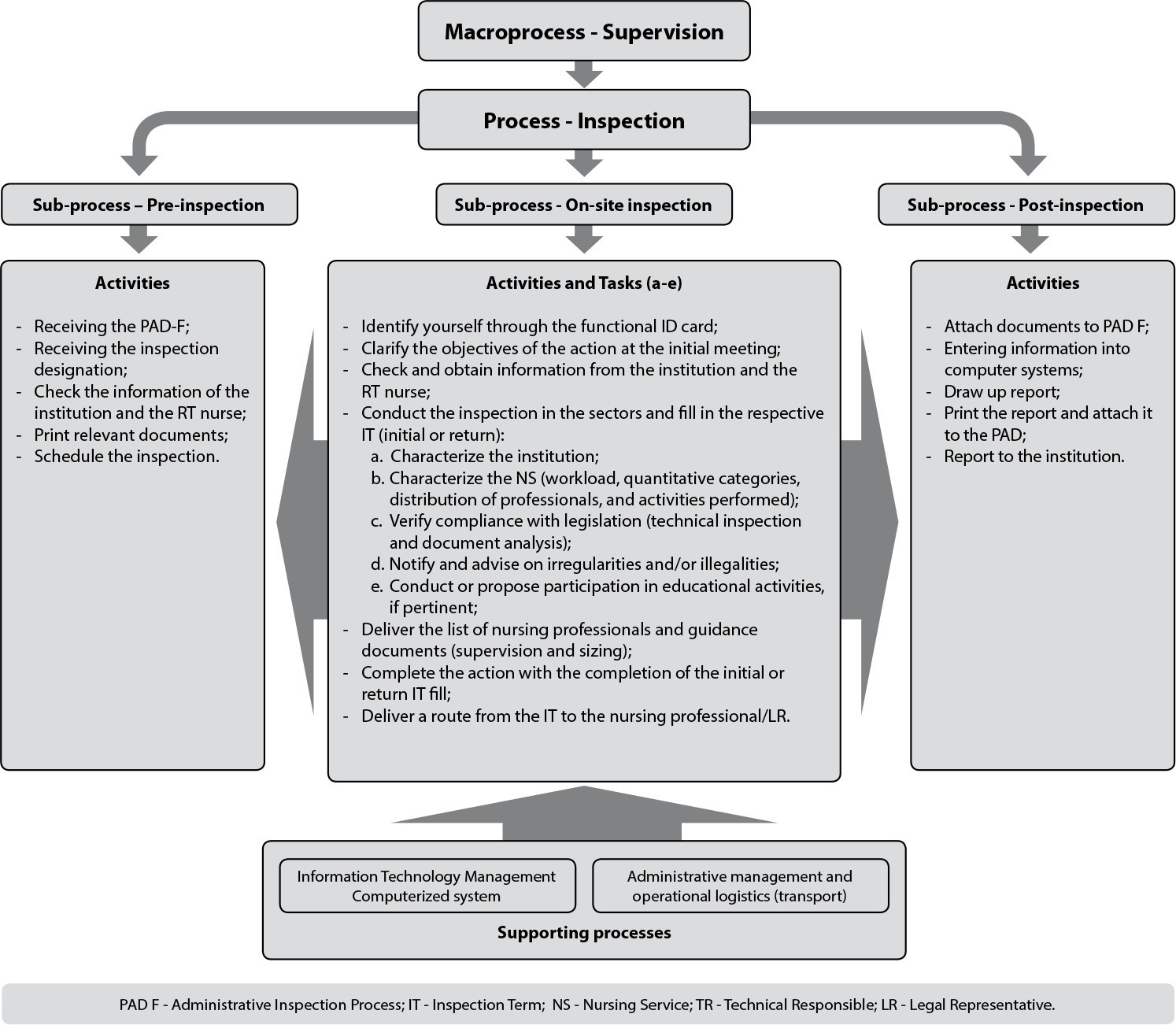
-
REVIEW10-17-2022
Authentic leadership in nurses’ professional practice: an integrative review
Revista Brasileira de Enfermagem. 2022;75(1):e20210972
Abstract
REVIEWAuthentic leadership in nurses’ professional practice: an integrative review
Revista Brasileira de Enfermagem. 2022;75(1):e20210972
DOI 10.1590/0034-7167-2021-0972
Views0See moreABSTRACT
Objectives:
to identify the primary constructs concerning authentic leadership and its relevance for nurses’ professional practice.
Methods:
integrative literature review conducted between 2015 and 2020 in LILACS, SciELO, and PubMed databases.
Results:
the United States published most of the 31 studies analyzed, with eight studies (25.8%), followed by Canada with seven studies (22.6%), and Brasil with five (16.1%). Most studies adopted a quantitative approach (77.41%), and 96.8% presented weak evidence. Three categories emerged: Work Engagement/Job Satisfaction and Organizational Commitment; Healthy Work Environment; and Intention to Quit the Job and Mental Exhaustion.
Final Considerations:
authentic leadership positively contributes to management and nursing care practice, promoting healthy work environments, structural empowerment, greater work engagement, and organizational commitment, decreasing absenteeism and mental exhaustion.
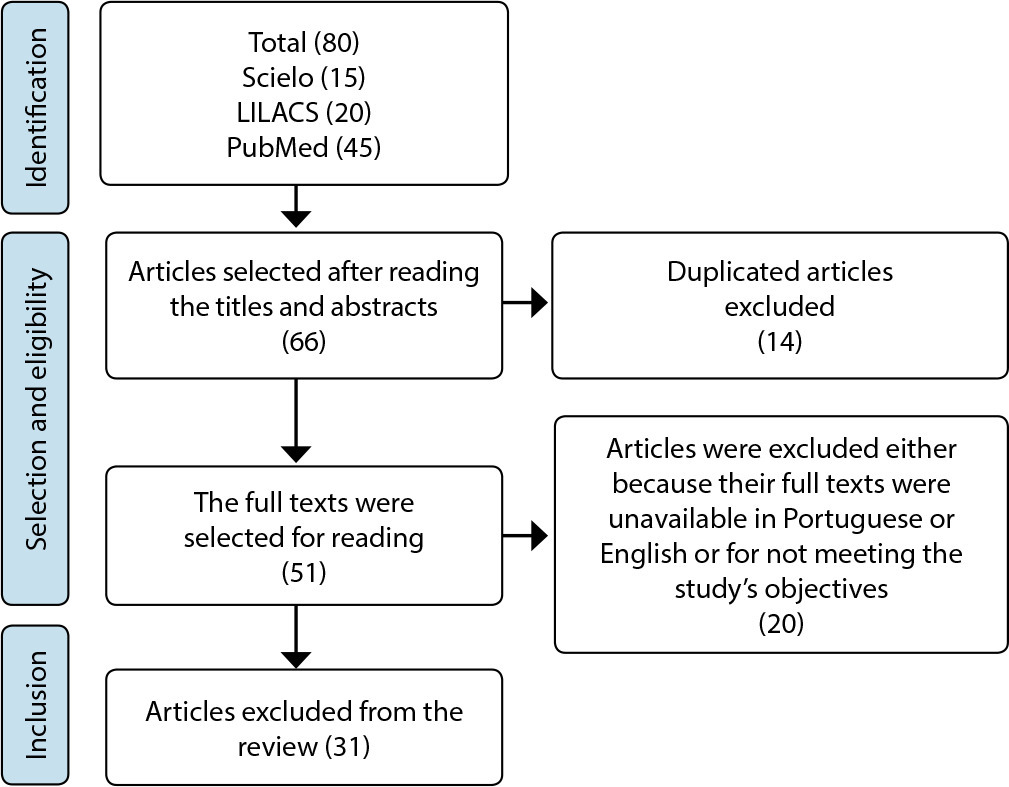
-
REVIEW10-07-2022
Strategies for thirst management in postoperative adult patients: a scoping review
Revista Brasileira de Enfermagem. 2022;75(4):e20220154
Abstract
REVIEWStrategies for thirst management in postoperative adult patients: a scoping review
Revista Brasileira de Enfermagem. 2022;75(4):e20220154
DOI 10.1590/0034-7167-2022-0154
Views0See moreABSTRACT
Objectives:
to map the strategies for managing thirst in postoperative adult patients.
Methods:
scoping review was conducted in October 2021 in 19 data sources: 14 databases and 5 platforms to search in the grey literature. It was prepared according to the recommendations of the Joanna Briggs Institute and the checklist of the Preferred Reporting Items for Systematic reviews and Meta-Analyses extension for Scoping Reviews. Nine selected articles were part of the final sample.
Results:
there is evidence of strategies to manage postoperative thirst using interventions such as water, ice, mentholated measures, carbohydrate and protein enriched fluid, oral hydrator, flavored gargling, cold gargling, wet gauze, 0.75% citric acid spray, and cold water.
Final Considerations:
the strategies observed may be reduced to cold and menthol use, salivary stimulants, and early introduction of fluids. The outcomes were positive in all the studies reviewed.
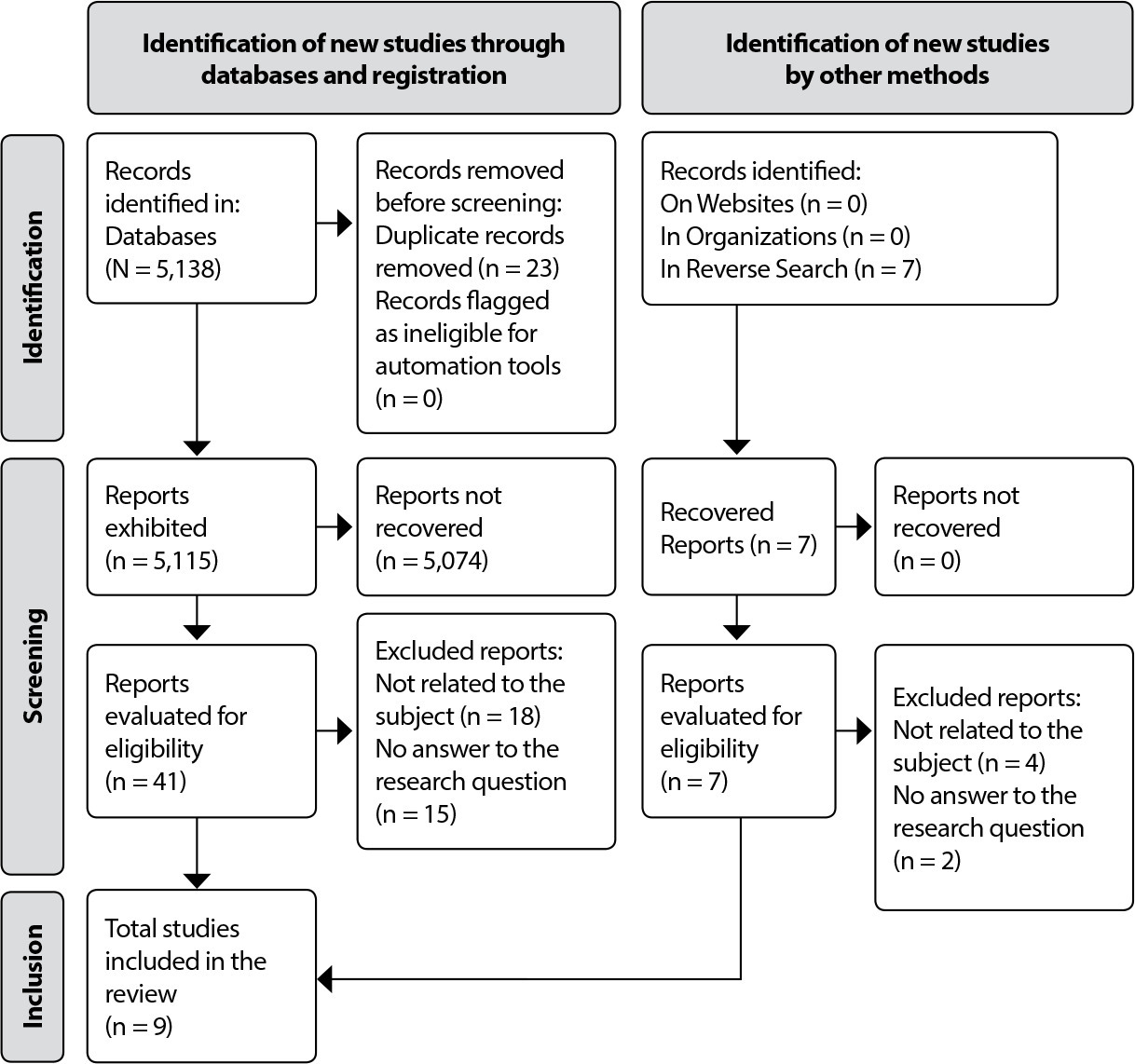
-
ORIGINAL ARTICLE10-07-2022
Perception of men perpetrators of violence about paternity
Revista Brasileira de Enfermagem. 2022;75(4):e20210890
Abstract
ORIGINAL ARTICLEPerception of men perpetrators of violence about paternity
Revista Brasileira de Enfermagem. 2022;75(4):e20210890
DOI 10.1590/0034-7167-2021-0890
Views0See moreABSTRACT
Objectives:
to learn about the perception of men in the judicial process due to spousal violence about paternity.
Methods:
a descriptive, qualitative study with nine men in the judicial process due to spousal violence. Data were collected through interviews; the men validated the data, which were systematized by the categorical thematic content analysis, and analyzed in light of scientific texts that discuss the subject.
Results:
the study allowed the creation of three categories: the father is the example for the son; the father must provide for the son’s needs; the father corrects the son.
Conclusions:
that context reveals the need to re-signify paternity to influence children’s education positively.
-
ORIGINAL ARTICLE10-07-2022
Construction and validation of a serial album for companions of patients with stroke
Revista Brasileira de Enfermagem. 2022;75(4):e20210843
Abstract
ORIGINAL ARTICLEConstruction and validation of a serial album for companions of patients with stroke
Revista Brasileira de Enfermagem. 2022;75(4):e20210843
DOI 10.1590/0034-7167-2021-0843
Views0See moreABSTRACT
Objectives:
to construct and validate a serial album, to be used in hospital discharge planning of patients with stroke.
Methods:
a methodological study, with construction of a serial album, validity by 22 judges and assessment by 22 companions. Data were collected from the Health Education Content Validity Instrument, with the companions, from the Suitability Assessment of Materials.
Results:
the serial album has 21 pages. The overall Content Validity Index was equal to 0.87 among expert judges and 1.0 among companions.
Conclusions:
the educational technology constructed was considered valid by the judges and assessed as understandable by the companions so that it presented itself as a viable technological resource for use in the health education of companions of patients with stroke.
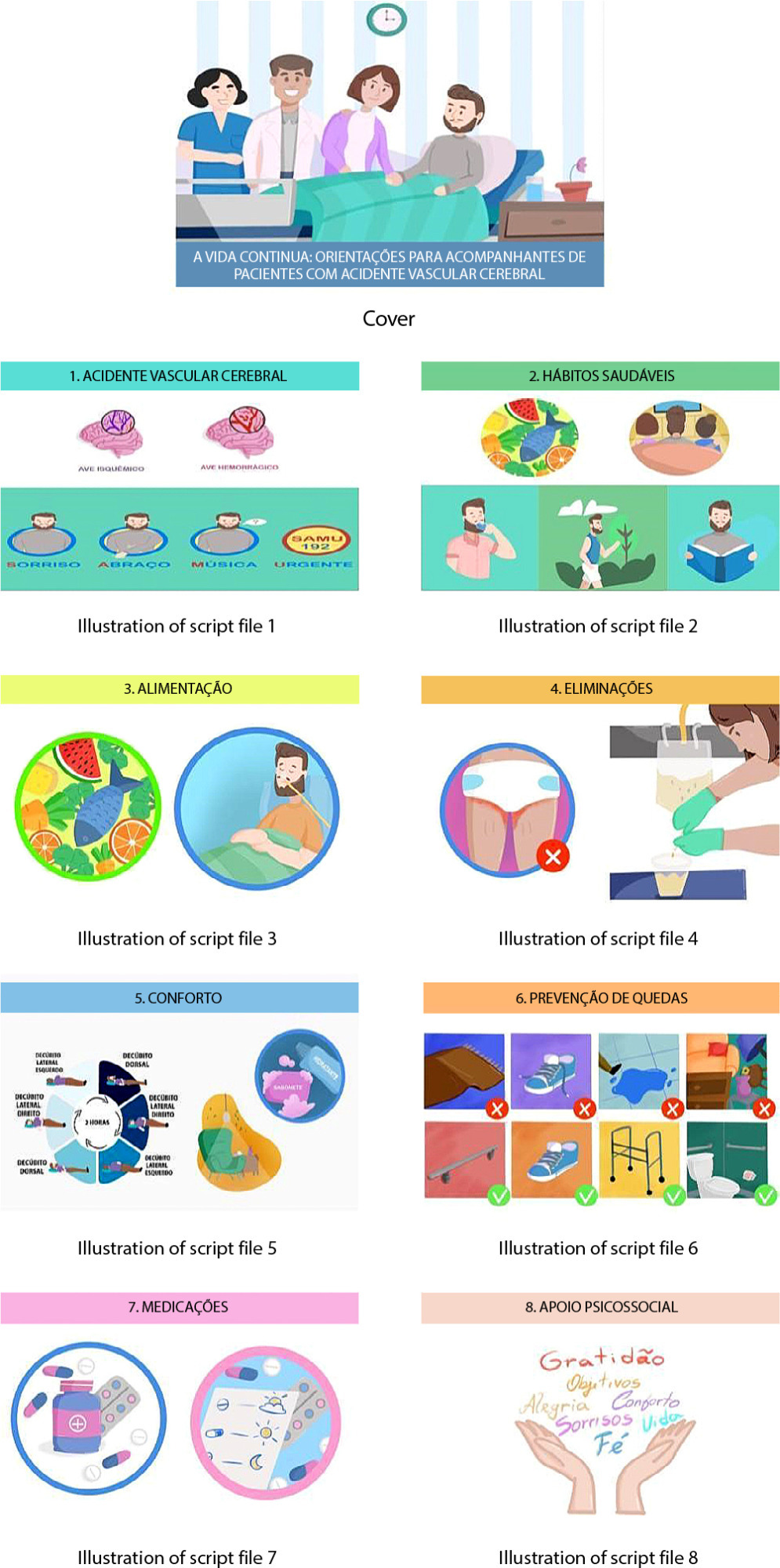
-
ORIGINAL ARTICLE10-07-2022
Violence against nursing workers: repercussions on patient access and safety
Revista Brasileira de Enfermagem. 2022;75(4):e20210765
Abstract
ORIGINAL ARTICLEViolence against nursing workers: repercussions on patient access and safety
Revista Brasileira de Enfermagem. 2022;75(4):e20210765
DOI 10.1590/0034-7167-2021-0765
Views1See moreABSTRACT
Objectives:
to analyze the repercussions of violence against nursing professionals, in the access and safety of patients in Family Health Strategy.
Methods:
a mixed study, with 169 nursing professionals. We used a socio-labor questionnaire, Survey Questionnaire Workplace Violence in the Health Sector, a patient safety instrument and interviews.
Results:
verbal aggression was related to support (p=0.048), respect (p=0.021), hours of care (p=0.047) and patient safety behaviors (p=0.033) among professionals. Suffering from bullying was related to fear of questioning when something is wrong (p=0.010) and lack of support from management (p=0.016). Victims of physical violence felt that their mistakes could be used against them. Mixed data converge and confirm that violence affects professional behavior and puts Primary Health Care attributes at risk.
Conclusions:
violence affects workers’ behavior, interferes with the care provided, weakens the access and safety of patients.
-
ORIGINAL ARTICLE10-07-2022
Nursing workload associated with neonatal mortality risk: a cross-sectional study
Revista Brasileira de Enfermagem. 2022;75(4):e20200965
Abstract
ORIGINAL ARTICLENursing workload associated with neonatal mortality risk: a cross-sectional study
Revista Brasileira de Enfermagem. 2022;75(4):e20200965
DOI 10.1590/0034-7167-2020-0965
Views0See moreABSTRACT
Objectives:
to analyze the association between nursing workload and neonatal mortality risk in newborns admitted to the Neonatal Intensive Care Unit.
Methods:
this is an observational, cross-sectional study conducted from January 2019 to January 2020.
Results:
the sample consisted of 399 newborns, 55.4% male, Nursing Activities Score mean of 67.5%, and Score for Neonatal Acute Physiology Perinatal Extension mean of 17.7, revealed itself as a predictor of the risk of death, while gestational age, length of hospitalization, and the first-minute Apgar established a protective relationship. The correlation between workload and neonatal mortality was low (r= 0.23, p=0.0009).
Conclusions:
the workload of the nursing team is not associated with the risk of mortality in the Neonatal Intensive Care Unit, as measured by the Nursing Activities Score.
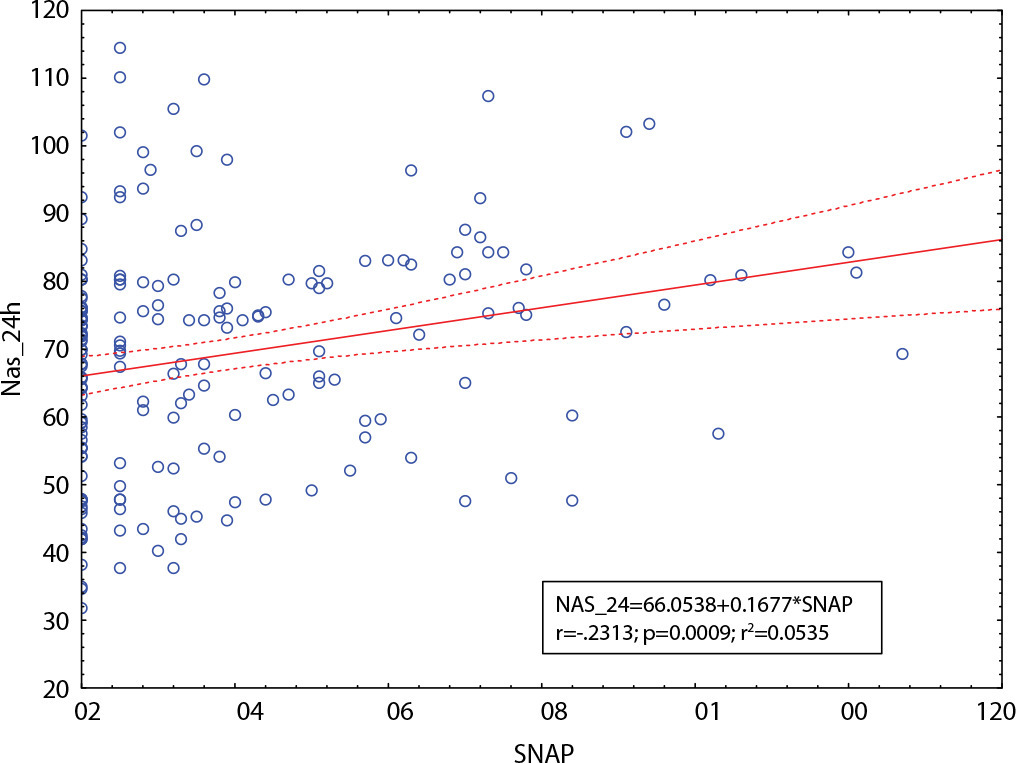
-
REVIEW10-03-2022
Intravenous therapy device labeling in Intensive Care Units: an integrative review
Revista Brasileira de Enfermagem. 2022;75(6):e20220049
Abstract
REVIEWIntravenous therapy device labeling in Intensive Care Units: an integrative review
Revista Brasileira de Enfermagem. 2022;75(6):e20220049
DOI 10.1590/0034-7167-2022-0049
Views0See moreABSTRACT
Objectives:
to synthesize the evidence on intravenous device labeling used to identify medications administered to patients in Intensive Care Units, with a view to preventing medication errors.
Methods:
an integrative review, in the LILACS, IBECS, Embase, MEDLINE, Scopus, Web of Science and CINAHL databases, from November to December 2021, using descriptors and selection criteria. Data were collected in 11 articles and subsequently classified, summarized and aggregated.
Results:
pre-designed labels, with pre-defined colors and information, help to prevent medication identification errors. There is still a lack of standardization in the practice of labeling syringes, intravenous lines, infusion pumps and saline solution bags. There are errors related to the lack of labeling devices or to their performance with incomplete information.
Conclusions:
device labeling is a barrier to defending the medication system safety and should be standardized.
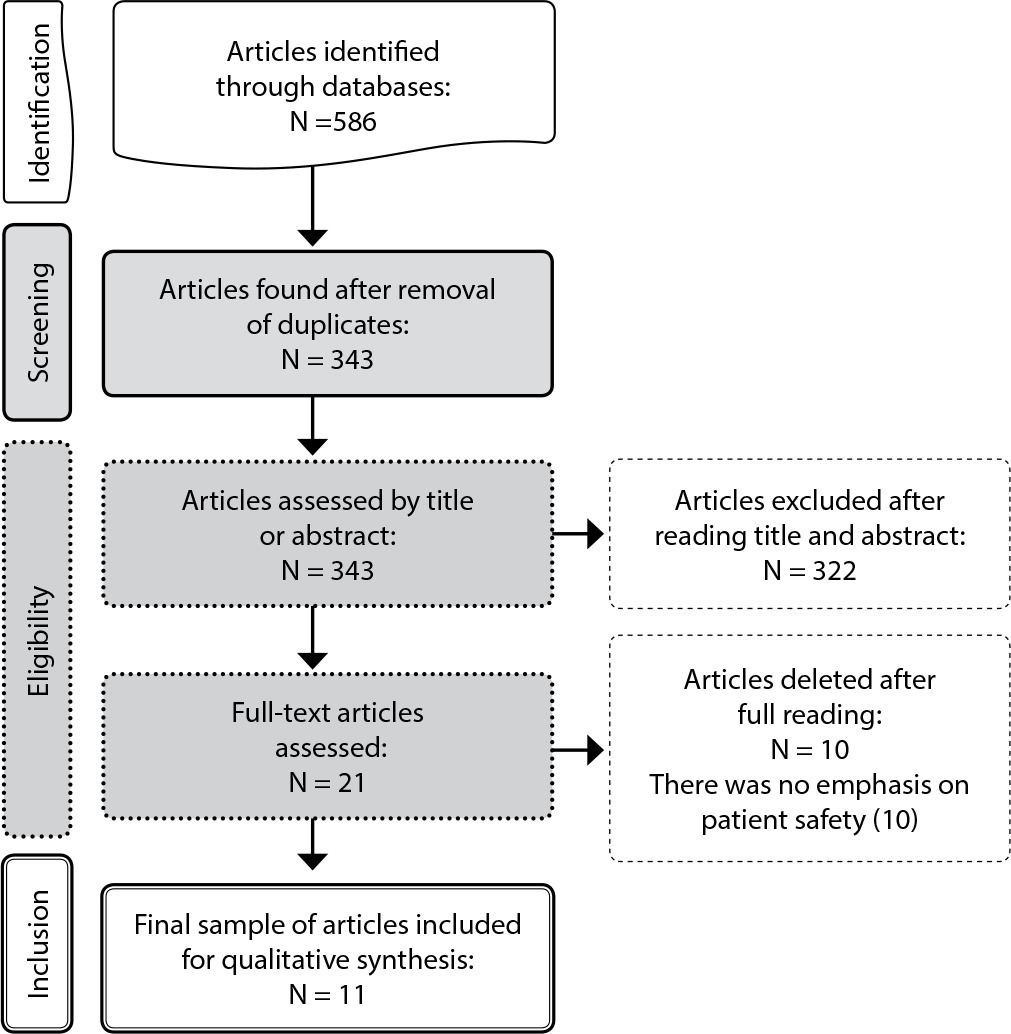
-
01-01-2015
Critical incidents in nursing academics: discovering a new identity
Revista Brasileira de Enfermagem. 2015;68(2):219-227
Abstract
Critical incidents in nursing academics: discovering a new identity
Revista Brasileira de Enfermagem. 2015;68(2):219-227
DOI 10.1590/0034-7167.2015680206i
Views0See moreABSTRACT
Objective:
a qualitative study that followed the principles of the grounded theory in order to analyze the professional identity of nursing academics through the analysis of the most disturbing critical incidents.
Method:
semi-structured interviews were conducted with seven nurses who worked as professors and researchers in a private university in Barcelona.
Results:
the resulting empirical material was organized into two categories: characterization of critical incidents and responsiveness to the incident.
Conclusion:
the professional identity of nurses regarding the academic area is still under construction and inexperience is the major obstacle in the management of critical incidents in the teaching career.
-
01-01-2015
Body mass index, waist circumference, and arterial hypertension in students
Revista Brasileira de Enfermagem. 2015;68(2):214-218
Abstract
Body mass index, waist circumference, and arterial hypertension in students
Revista Brasileira de Enfermagem. 2015;68(2):214-218
DOI 10.1590/0034-7167.2015680205i
Views0See moreABSTRACT
Objective:
to investigate what is the best anthropometric predictor of arterial hypertension among private school students.
Method:
this was a cross-sectional study with 286 students between the ages of 10 and 14 from two private schools in the city of Paranavaí, Paraná, Brazil. The following variables were analyzed: body mass index, waist circumference and blood pressure. Statistical analysis was conducted with Pearson’s partial correlation test and multivariate logistic regression, with p<0.05.
Results:
both anthropometric indicators displayed weak correlation with systolic and diastolic levels, with coeffi cients (r) ranging from 0.27 to 0.36 (p < 0.001). Multivariate analysis showed that the only anthropometric indicator associated with arterial hypertension was waist circumference (OR= 2.3; 95% CI: 1.1-4.5), regardless of age or gender.
Conclusion:
this age group, waist circumference appeared to be a better predictor for arterial hypertension than body mass index.
-
01-01-2015
Perception of primary healthcare management nurses on the nursing process
Revista Brasileira de Enfermagem. 2015;68(2):206-213
Abstract
Perception of primary healthcare management nurses on the nursing process
Revista Brasileira de Enfermagem. 2015;68(2):206-213
DOI 10.1590/0034-7167.2015680204i
Views0See moreABSTRACT
Objective:
this qualitative study aimed to analyze the perceptions of primary health care management nurses on the nursing process.
Method:
data were collected through interviews and analyzed by the Content Analysis proposed by Bardin’s theoretical framework.
Results:
managers recognize the importance of the nursing process, although its implementation was not a priority at the time of the interviews. A conceptual diffi culty and a lack of understanding that the implementation of the care methodology should be a cross-departmental action in the local healthcare management were clearly observed.
Conclusion:
managers should have their perspectives broadened concerning the relevance of the nursing process and the professional training. The active participation of legislative nursing bodies, local healthcare management and the federal government may open the way for the effective implementation of the nursing process.
-
01-01-2015
Cross-cultural cultural adaptation of the “Nursing Students’ Attitudes Toward Mental Health Nursing and Consumers” in Brazil
Revista Brasileira de Enfermagem. 2015;68(2):198-205
Abstract
Cross-cultural cultural adaptation of the “Nursing Students’ Attitudes Toward Mental Health Nursing and Consumers” in Brazil
Revista Brasileira de Enfermagem. 2015;68(2):198-205
DOI 10.1590/0034-7167.2015680203i
Views0See moreABSTRACT
Objective:
to make across-cultural adaptation of the “Nursing Students’ Attitudes Toward Mental Health Nursing and Consumers” scale in Brazil.
Method:
the scale was tested regarding conceptual, item, semantic, and operational equivalence.
Results:
content validation was conducted by an expert committee with a minimum consensus level of 80%. This process resulted in a 35-item scale divided into 6 factors. The experts reached 100% consensus on the scale’s clarity of language, practical pertinence and theoretical relevance, as well as on the need for excluding one factor. Data were collected in 2013 in the city of Londrina, Paraná, Brazil.
Conclusion:
the instrument was cross-culturally adapted to Brazilian Portuguese and presented satisfactory content validity. We propose further studies on the scale’s psychometric properties, such as construct validity, internal consistency and reliability.
-
01-01-2015
Relational skills and preserving patient privacy in the caring process
Revista Brasileira de Enfermagem. 2015;68(2):191-197
Abstract
Relational skills and preserving patient privacy in the caring process
Revista Brasileira de Enfermagem. 2015;68(2):191-197
DOI 10.1590/0034-7167.2015680202i
Views0See moreABSTRACT
Objective:
to analyze the development and mobilization of relational skills central to the caring process among nursing students throughout their professional training.
Method:
this was a quantitative study, descriptive and cross-sectional in design. The sample consisted of nursing undergraduate students from the Higher School of Health Sciences, in the city of Évora, Portugal. Data were collected using the previously validated Helping Relational Skills Inventory.
Results:
the students gradually acquired “generic skills”, “communication skills” and “contact skills”, presenting the highest mean score in the last year of the program. However, the highest mean score for the “empathetic skills” subscale was presented by second-year students.
Conclusion:
age and year in program were found to be decisive variables regarding the acquisition of specifi c skills (empathetic and communication) by nursing students.
-
01-01-2015
The Brazilian Association of Nursing in the uncompromising defense of the Brazilian Unified Health System
Revista Brasileira de Enfermagem. 2015;68(2):185-186
Abstract
The Brazilian Association of Nursing in the uncompromising defense of the Brazilian Unified Health System
Revista Brasileira de Enfermagem. 2015;68(2):185-186
DOI 10.1590/0034-7167.2015680201i
Views0The title of the 2015 Editor’s Comments could very well be from a journal published in decades past, a time when, in Brazil, all professional entities and civil society fought for the right to health, as was later established in the Brazilian Constitution of 1988. Twenty-five years later, despite its financial limitations and restricted operational […]See more -
01-01-2015
A ABEn na defesa intransigente do SUS
Revista Brasileira de Enfermagem. 2015;68(2):185-186
Abstract
A ABEn na defesa intransigente do SUS
Revista Brasileira de Enfermagem. 2015;68(2):185-186
DOI 10.1590/0034-7167.2015680201i
Views0Este título do Editorial de 2015 bem poderia ser de uma revista publicada em décadas passadas, período em que todas as entidades profissionais e a sociedade civil lutaram pela saúde como direito, como conquistado na Constituição de 1988. Vinte e cinco anos depois, com o Sistema Único de Saúde capilarizado por todo o país, mesmo […]See more -
EXPERIENCE REPORT01-01-2015
Nursing diagnoses and interventions for a child after cardiac surgery in an intensive care unit
Revista Brasileira de Enfermagem. 2015;68(1):155-160
Abstract
EXPERIENCE REPORTNursing diagnoses and interventions for a child after cardiac surgery in an intensive care unit
Revista Brasileira de Enfermagem. 2015;68(1):155-160
DOI 10.1590/0034-7167.2015680121i
Views0See moreObjetivo:
descrever o julgamento clínico de enfermagem para identificar diagnósticos NANDA e desenvolver um plano de tratamento NIC para uma criança em pós-operatório de cirurgia cardíaca em terapia intensiva.
Método:
estudo de caso com coleta de dados retrospectiva no prontuário.
Resultados:
três enfermeiras identificaram diagnósticos NANDA e intervenções NIC. Criança de 6 meses, submetida a cirurgia cardíaca, necessitou oxigenação extracorpórea por membrana no pós-operatório. Foram identificados quatro principais diagnósticos, aos quais foram direcionadas dez intervenções. A proposta de intervenções para responder às necessidades humanas prioritárias da criança foi otimizada pelo uso das terminologias padronizadas. Todos os diagnósticos foram sustentados por indicadores diagnósticos; todas as intervenções foram cientificamente sustentadas.
Conclusão:
espera-se que os enfermeiros abordem não somente as respostas fisiológicas, mas também aquelas dos domínios psicossociais.
Search
Search in:
Nuvem de Tags
Adolescente (85) Atenção Primária à Saúde (239) COVID-19 (91) Criança (91) Cuidados de Enfermagem (269) Educação em Enfermagem (151) Educação em Saúde (139) Enfermagem (930) Enfermagem Pediátrica (86) Estudantes de Enfermagem (77) Estudos de Validação (131) Família (87) Idoso (208) Promoção da Saúde (99) Qualidade de Vida (104) Saúde do Trabalhador (86) Saúde Mental (145) Saúde Pública (82) Segurança do Paciente (150) Tecnologia Educacional (100)



